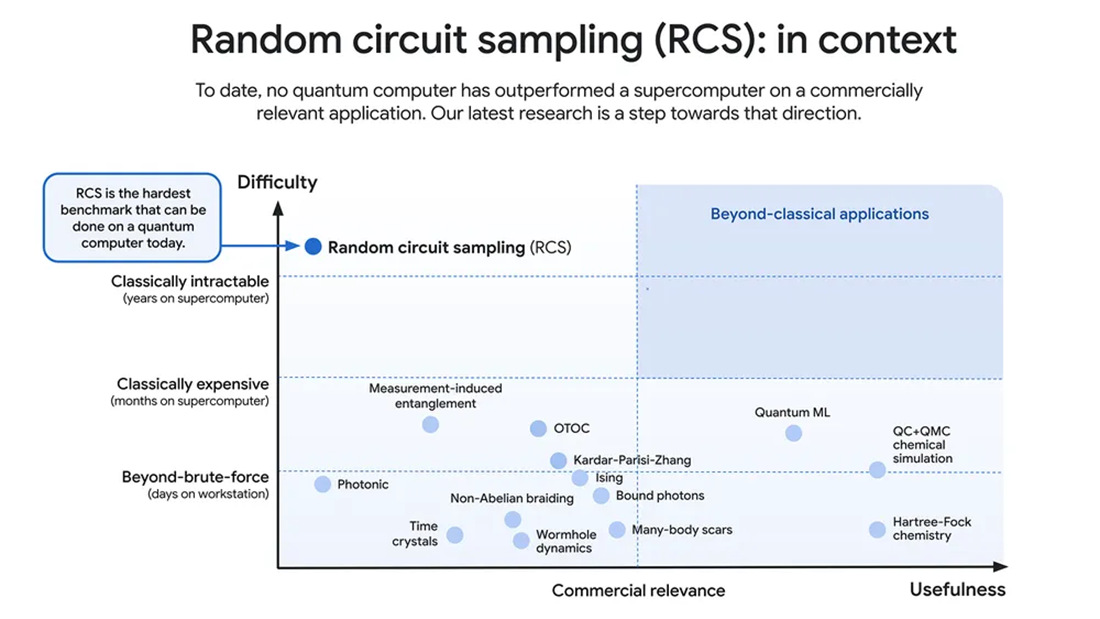In case you have missed it, Google announced some pretty impressive achievements in the field of quantum computing on Monday. Tucked away in the announcement by the lead of Google Quantum AI was a suggestion that its quantum computer may have achieved these feats with the help of calculations performed in a different universe.
According to the internet giant, their new quantum chip, named Willow, can exponentially reduce errors as it uses more qubits. This is a big step forward, with errors and decoherence being some of the biggest challenges in quantum computing since its inception.
With the chip, Google claims it is moving towards quantum computers being “commercially relevant”. To be so, quantum computers need to be able to outperform traditional computers, and Google says it can do that – at one specific task, at least.
“Willow performed a standard benchmark computation in under five minutes that would take one of today’s fastest supercomputers 10 septillion (that is, 1025) years — a number that vastly exceeds the age of the Universe,” Hartmut Neven, founder and lead of Google Quantum AI, explained in a press release.
While that sounds impressive – and it is, if you wanted this specific answer without waiting 10,000,000,000,000,000,000,000,000 years – the problem is that the task given to the computer isn’t all that useful.
“The particular calculation in question is to produce a random distribution. The result of this calculation has no practical use. They use this particular problem because it has been formally proven (with some technical caveats) that the calculation is difficult to do on a conventional computer (because it uses a lot of entanglement),” said physicist and science communicator Sabine Hossenfelder, reacting to the news on X (Twitter).
“It’s exactly the same calculation that they did in 2019 on a ca 50 qubit chip. In case you didn’t follow that, Google’s 2019 quantum supremacy claim was questioned by IBM pretty much as soon as the claim was made and a few years later a group said they did it on a conventional computer in a similar time.”
While quantum computers are improving, they are still far from practical. In fact, Google launched a global competition just this year offering $5 million for finding a practical use for the machines.

The task is rated as difficult for a supercomputer, but not very commercially relevant.
Image credit: Google Quantum AI
So while it is exciting that Google is taking steps towards useful quantum computers, it’s not time to get too excited just yet. And it’s certainly not time to declare that we might be living in a multiverse.
That may seem like a strange thing to say, but it is made necessary by a strange claim tucked away in Google’s announcement. According to Neven, the fact that the computer can perform such a calculation “lends credence to the notion that quantum computation occurs in many parallel universes, in line with the idea that we live in a multiverse, a prediction first made by David Deutsch.”
In other words, the lead of Google’s quantum computing department thinks the work might be being done in another branch of the multiverse, as in the Many Worlds interpretation of quantum mechanics.
Quantum computers use quantum mechanics to solve problems that are simply too complex to be calculated by traditional computers, or even supercomputers – in theory anyway. While classical computers use gates to perform calculations and two states, 1s and 0s, to represent information, quantum computers are probabilistic and rely on the wave/particle nature of matter.
“Quantum computers use changes in the quantum states of atoms, ions, electrons or photons. Quantum computers link, or entangle, multiple quantum particles so that changes to one affect all the others,” Sorin Adam Matei, Associate Dean of Research at Purdue University explains in an article for The Conversation.
“They then introduce interference patterns, like multiple stones tossed into a pond at the same time. Some waves combine to create higher peaks, while some waves and troughs combine to cancel each other out. Carefully calibrated interference patterns guide the quantum computer toward the solution of a problem.”
Since quantum computers rely on superposition, where particles are assumed to be in many states before they are observed, this can lead to absurdities depending on your particular favorite flavor of interpretations of quantum mechanics.
In the Copenhagen interpretation, the particles really are in this state of all positions before measurement. In hidden variable theories (much less popular than the standard interpretation), the wave function is a mathematical description of what we observe, and we are missing something fundamental.
Then there is the Many Worlds interpretation, where there is only the wave function, and the entire universe is in a superposition. During observation, there is no collapse, but a branching of the worlds.
Instinctively you might think this idea, which is certainly a fringe interpretation, would have a problem with quantum computers. But in the idea referenced by Neven, Deutsch suggested that they work through “quantum parallelism”. In this idea, the interference relied on in quantum computers takes place across universes (a result of the wave function not really collapsing) ensuring that the desired outcome is more probable when measured.
While some, including Max Tegmark, have suggested that working quantum computers would prove the existence of the multiverse, this is really jumping the gun. Quantum computers rely on quantum mechanics, and not any specific interpretation of it, as far as we have evidence. They work under the Copenhagen interpretation, and are possible in hidden variable theories too.
Though what Google has done with quantum computers is pretty neat, it is far from practical, and by no means proof that it performed calculations across many, many universes.
Source Link: Google Suggests Its Quantum Computer May Use Other Universes To Perform Calculations